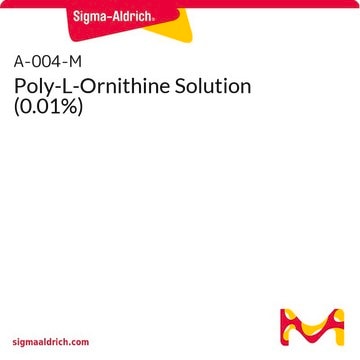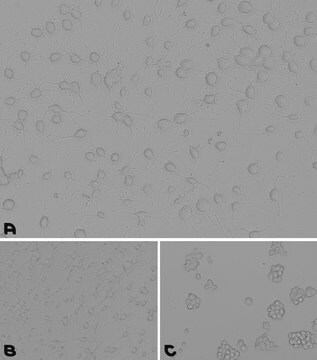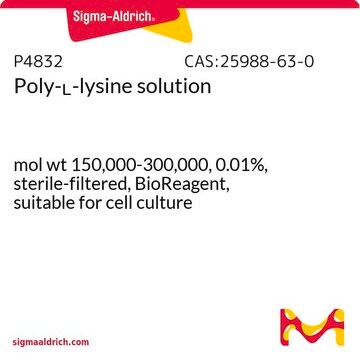P4957
Poly-ʟ-Ornithine
synthetic, mol wt 30,000-70,000, liquid, 0.01%, suitable for cell culture
About This Item
Recommended Products
product name
Poly-L-ornithine solution, mol wt 30,000-70,000, 0.01%, sterile-filtered, BioReagent, suitable for cell culture
biological source
synthetic
sterility
sterile-filtered
product line
BioReagent
form
solution
mol wt
30,000-70,000
packaging
pkg of 50 mL
concentration
0.01%
technique(s)
cell culture | mammalian: suitable
surface coverage
4 μg/cm2
impurities
endotoxin, tested
shipped in
ambient
storage temp.
2-8°C
SMILES string
Br.NCCCC(N)C(O)=O
InChI
1S/C5H12N2O2.BrH/c6-3-1-2-4(7)5(8)9;/h4H,1-3,6-7H2,(H,8,9);1H
InChI key
GWRQMKDBBHFVIZ-UHFFFAOYSA-N
General description
Application
Biochem/physiol Actions
Preparation Note
related product
Storage Class Code
10 - Combustible liquids
WGK
WGK 3
Flash Point(F)
Not applicable
Flash Point(C)
Not applicable
Certificates of Analysis (COA)
Search for Certificates of Analysis (COA) by entering the products Lot/Batch Number. Lot and Batch Numbers can be found on a product’s label following the words ‘Lot’ or ‘Batch’.
Already Own This Product?
Find documentation for the products that you have recently purchased in the Document Library.
Customers Also Viewed
Articles
Discover L-ornithine, an important amino acid supplement, explore how L-ornithine is used in CHO and iPSC culture, and discover how poly-L-ornithine is used to enhance cell attachment.
Poly-Lysine enhances cell binding with positively-charged surface ions, optimizing electrostatic interaction on culture surfaces for increased cell attachment.
Frequently asked questions about neural stem cells including NSC derivation, expansion and differentiation.
Derivation and characterization of functional human neural stem cell derived oligodendrocyte progenitor cells (OPCs) that efficiently myelinate primary neurons in culture.
Protocols
A stem cell culture protocol to generate 3D NSC models of Alzheimer’s disease using ReNcell human neural stem cell lines.
Step-by-step culture protocols for neural stem cell culture including NSC isolation, expansion, differentiation and characterization.
Our team of scientists has experience in all areas of research including Life Science, Material Science, Chemical Synthesis, Chromatography, Analytical and many others.
Contact Technical Service











